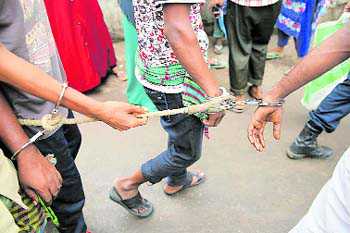AS the country ponders over the various aspects of the imposition of Emergency 41 years ago, attention needs to be drawn to a law awaiting notification that may serve well in preventing similar suppression of civil liberties again.
The Modi government would do well to notify the date for the enforcement of Section 3 of the Constitution (44th Amendment) Act, 1978, which has not been done thus far despite passage of more than three and a half decades of its passing.
Section 3 substitutes Clauses 4 and 7 in Article 22 of the Constitution relating to the subject of “preventive detention”, often referred to as “constitutional tyranny,” much abused during the Emergency period.
The duly amended but yet-to-be-enforced Clause 4 stipulates that no law providing for preventive detention shall authorise the detention of a person for more than two months unless an Advisory Board “constituted in accordance with the recommendations of the Chief Justice of the appropriate High Court” has reported before the completion of two months that there is sufficient cause for the detention. As of today, in Clause 4, the ‘maximum period’ is three months and there is no mention of the Chief Justice, much less his assigned role.
The amended clause also provides that the Advisory Board would consist of a chairman and not less than two other members with the former being a serving judge of the appropriate high court and the latter two being either serving or retired judges of any high court. At present, no strength is prescribed for the board. And the executive government may on its own appoint people on the board who may not even be serving/retired high court judges, though they have to be “qualified” for the job.
Most importantly, the amended clause omits a sub-clause (a) of Clause 7 in Article 22 which currently provides that Parliament may by law provide for circumstances under which, and the class or classes of cases in which, a person may be detained for a period longer than three months under any law providing for preventive detention without obtaining the opinion of an advisory board. This liberty would to be completely dispensed with under the amended Article 22(4).
The 44th Constitution Amendment was enacted in June 1979 during the tenure of the Morarji Desai-led Janata government that was swept to power in the General Election held after the Emergency was lifted. Unfortunately, the tenure of this regime was short-lived. Thereafter, the very same leader who imposed the Emergency returned to power, and the enforcement of the particular section was put in the cold storage.
A Constitution Bench of the Supreme Court in December 1981 by a majority judgment in “AK Roy Vs Union of India” ruled that as the Act itself authorised the executive government to issue the requisite notification so as to appoint dates for commencement of different sections of the Act, the court could not compel the government in this regard.
But one wonders why the same lackadaisical attitude in the enforcement of this amendment was adopted by the subsequent non-Congress regimes too.
The National Commission to Review the Working of the Constitution (NCRWC) appointed by the Vajpayee-led NDA government in its final report of March 2002 had also strongly recommended its immediate enforcement. It even mooted a suggestion for incorporating explicitly that the maximum period of preventive detention should not exceed six months in the amended Article 22. Yet, the then dispensation too remained silent over this issue.
Whether this an inadvertent omission or intentional is anybody’s guess. A year ago in June 2015, this author wrote to the Prime Minister’s Office (PMO) urging immediate enforcement of the Section on the 40th anniversary of the Emergency. A reply from the PMO within days said that the plea as received had been transferred to the Union Home Ministry for appropriate action. Nine months later, a communication was received which said that as the matter pertained to another division of Internal Security, it had been transferred there. The public grievances portal of the Government of India shows the current status of the plea as being closed, albeit with the remark that the suggestion had been noted.
Recently, the author also preferred an RTI application with the PMO, seeking all information regarding the inordinate delay in the Central Government’s enforcement of the Section, pointing out that it had been more than thirty-seven years since the enactment of the amendment.
The CPIO in the PMO transferred this plea to the Legislative Department under the Union Law Ministry, which in turn has sent it to the Ministry of Home Affairs. A response from the same is awaited.
If the powers that be would rather keep the enforcement of this provision in perpetual state of abeyance, then would not it be better to omit or repeal it from our statute book itself?
It perhaps remains the only piece of legislation from the long list of straight 100 amendments enacted in our Constitution till date that is yet to be enforced or implemented.
It is strongly suggested to the Modi government to either appoint a date at once for enforcing this Section, or else consider including it in the next edition of the Repealing and Amending Bill, meant to eliminate obsolete and redundant laws.
The writer is an advocate and legal journalist.
Unlock Exclusive Insights with The Tribune Premium
Take your experience further with Premium access.
Thought-provoking Opinions, Expert Analysis, In-depth Insights and other Member Only Benefits
Already a Member? Sign In Now











